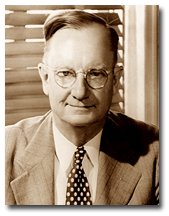1882 – 1973
Formulated theory of social distance out of his interest in racial relations
Emory Bogardus came to know well the migrant farm laborers who gathered every year to bring in the harvest while he was a child in Indiana. This experience sharpened his interest in cultural and ethnic attitudes in the United States. While earning his MA from Northwestern University and his Ph.D. from the University of Chicago, both in sociology, he lived in a settlement house in a crime-ridden slum district. There, he worked with immigrant laborers employed in steel mills and directed a boys’ club with a high proportion of delinquent youth. He then joined the economics faculty of the University of Southern California, where in 1915, he established the first Sociology Department in the West, and in 1920 the first school of social work in the West. He later became the Dean of the USC Graduate School.
Bogardus arrived in California just as Hiram Johnson’s and the Municipal League’s ambitious Progressive reform program emerged in 1911, reshaping the political and economic life of the state. It not only instituted enfranchisement of women and recall of the judiciary, but a distinctive form of government: the state, local or municipal commission, usually run by unpaid appointed professionals for reform and regulatory purposes. Bogardus’ appointment to two such Commissions gave him valuable insight into the working of government politics as these bore on the provision of public social services, and this service enabled him to introduce widespread reforms. He served on the housing Commission, the focus of which was housing and health, especially of the poor and the immigrants. He chaired the Los Angeles Commission on Public Welfare that established standards and procedures, some still existing, which were emulated by similar commissions elsewhere in the state. For many years, he served on a number of voluntary social agency boards as a very active member.
He conducted a monumental study on “social distance” still used the world over to examine cultural and ethnic attitudes. Concurrently, he encouraged masters and doctoral students to examine a variety of issues and experiences that provided insight into social problems and the means developed to deal with them. These still constitute a primary source for examining and coping with major social issues in the arena of health, economic need, labor and industry, race relations, social control, community organization, and the refinement of professional social work education and services.
Bogardus authored numerous articles and 24 books, some of which have been used as texts and a number of which have been translated into other languages. He was also the founder of The Journal of Sociology and Social Research, which he edited for 45 years. His influence on California social welfare and on the beginnings of social work education is incalculable.
